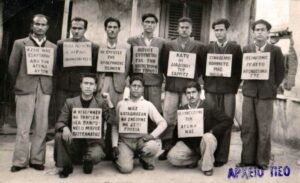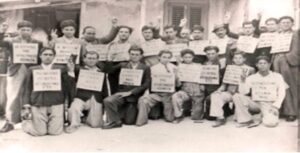
The 1st March 1944 strike and the struggle to win the Automatic Cost of Living Allowance
90th anniversary Communist Party of Cyprus-AKEL
 Article by Yiannakis Colocasides, member of the CC. of AKEL
Article by Yiannakis Colocasides, member of the CC. of AKEL
Sunday 28th February 2016, “HARAVGI” newspaper

Striking workers on 1st March 1944
The strike of 1st March 1944 was the culmination of the worker’s struggles in the period of the Second World War and at the same time the harbinger of the great class struggles in 1948.
The living conditions of Cypriot workers during the war worsened even more as a result of the food shortages, the black market and profiteering. The British colonial government didn’t do anything to address the situation. One can understand the sharp rise in prices if you compare the prices of essential goods in 1944 with the corresponding prices of 1939. This comparison shows a 40% increase in the price of bread, 105% increase in the price of meat, 266% in halloumi cheese, 460% increase in the price of potatoes, 157% in beans and 150% in the price of olives. How much the living conditions of the Cypriot population had worsened during the war can be illustrated by some other figures, such as for example the fact that infant mortality in 1942 was higher than that of 1916!
The Pancyprian Trade Union Committee (PTUC) evaluating specifically this state of affairs undertakes the waging of working people’s struggles aiming at the government institutionalizing a credible prices index, the lowering of prices and the goal of linking wages to the price index. The strike struggles to achieve these goals began with the strike of December 1942 and continued with the strikes in August and October 1943.
The PTUC was fully aware that the fight for a cost of living allowance was primarily a political struggle. This is the reason why the Report to the Third All-Cyprus Trade Union Conference stressed the following: “Our struggle for the fall of the price index is political. The implementation of illiberal laws makes the combination of the struggle against the high price index with our struggle against the illiberal laws imperative.”

The edition of the newspaper “Independent” on the day of the nation-wide strike
The strike battle
The colonial government’s negative stand towards the demands of the trade union movement led to the strike of 1st March 1944. For tactical purposes the strike was organized only in the public works sector. Around 1,500 workers took part in the strike which lasted 23 days. Greek Cypriot and Turkish Cypriot workers participated in the strike together. The daily newspaper “Independent” which was following daily the development of the strike writing detailed reports, informs us that the Turkish Cypriot worker Mounir Raif was also elected to the five-member worker’s strike committee in Nicosia.
The specific demands that had been projected were: 1. Readjustment of wages to the price index, 2. Implementation of the PTUC’s proposals for the reduction of the price index, 3. the granting of a family allowance, 4. Paid recreation leave, 5. granting of sickness allowance, 6. Improvement of technical schools and 7. warning in case of dismissal.
During the 23 days of the strike unprecedented in size and militancy meetings and demonstrations took place, not only with the participation of the strikers themselves, but also of large masses of the people. The popular mobilizations organized on 13th and 19th March were considered as more serious. In both cases they were announced as nation-wide mobilizations. Unprecedented in size and militancy meetings were also organized. In both cases restaurants were closed, no newspapers were published, leisure centres were closed, the railroad stopped working and taxi drivers went on strike. During the days of nation-wide mobilizations other demonstrations were organized in all the towns with mass pickets involving hundreds of people. Dozens of horseback policemen and others followed the pickets. Colonialism however didn’t dare beat the strikers and the thousands of people applauding the worker’s mobilizations.
The solidarity movement with the strikers assumed great and emotional dimensions. Fundraising campaigns to support the strikers were organized. Although the Nicosia Mayor Dervis gave permission for the waging of a public fundraising campaign, the people gave what they could from their meagre savings. 700 shopkeepers in Nicosia decided to provide food on a daily basis for 125 strikers and barbers offered their services to 200 strikers for free. The “Independent” mentions a characteristic statement made by the barber Efstathios Paionides, who wrote the following to the strikers: “I’m poor just like you. But my barber’s shop is at the service of any striking worker. I also send you one pound in solidarity”. The statement made by the coffeehouse owner Nikoli Lambrianides was also representative: “I feel deeply the great just cause of your struggle. March forward as fighters of the working people’s cause. I have nothing to give you. 12 strikers will drink coffee with their cigarette every morning in my cafe. This is what I have to offer. Be strong, at the forefront of the struggle.” Local clubs, associations and organizations approved resolutions in solidarity with the strike. Sport clubs organized football matches, giving the proceeds to strike funds. Peasants collected potatoes and other foods and sent them every day to the striking workers. Primary and secondary school teachers, school students, policemen, sanatoria patients and hospitals, churches expressed their moral and practical support.
AKEL
AKEL’s was from the very beginning on the side of the strikers. On 2nd March the C.C. of AKEL issued a declaration in which, referring to the proposals that had been submitted by the Pancyprian Trade Union Committee to address rising prices, denounced the government because it didn’t take these proposals into account and concluded: “The Progressive Party of the Working People a product and born from the inside of the working people, the offspring of the struggles of this people, can only stand in support of the striking workers in their just struggle for bread. The C.C. of the Party addresses a warm greeting, expresses its sympathy and its solidarity with the striking workers. The C.C. calls on all the members of the Party – in the city and countryside, workers, peasants and middle strata – to show as always a spirit of solidarity and to help the struggling workers by offering every moral and material assistance to the workers.” On 15th March the C.C. of AKEL issues another declaration stating that “…the strikers are fighting not only for their own bread, but also for the bread of the whole people; not only for their own freedom, but for the freedom of all the people.”
On 16th March the Central Committee of AKEL sent a telegram to the British Prime Minister Winston Churchill, demanding his intervention and recalling that the Cypriots are fighting together with Britain in the war against Hitler fascism.
In addition, AKEL through the London Cyprus Committee informs and mobilizes Labour Party Members of Parliament in favour of the strikers who raise the issue in the House of Commons and tables questions to Ministers of the British government. The “Independent” newspaper hosts regular reports from London, written by Ezekias Papaioannou, which record the initiatives undertaken in the British capital by the Cyprus Committee.
The Party attaches such importance to the strike struggle of 1st March that it postpones its Congress that was scheduled to convene on 5th March so that without interruption it follow the development of the strike.
Leontios
The Pancyprian Trade Union Committee had published a pamphlet entitled “Worker-peasant exposure of Indices” which it sent to organizations and figures of the country. One of the recipients was the Bishop of Paphos, Leontios, elected to be the new Archbishop. The “Independent” published the reply of Leontios on the day just as the strike began. Inter alia, he wrote the following: “We warmly congratulate the Pancyprian Trade Union Committee and its organizations in the cities and sectoral organizations for their selfless constant activity and for their energetic actions to improve their economic conditions … above all of poor households, indeed of impoverished large families, who have no other sources. We reassure that the just struggle to improve living conditions has our warmest sympathy.”
Each and every one can compare the language of Leontios with that of the current Head of the Church and draw his/her conclusions!
A significant victory
The colonial government at the beginning refused any dialogue with the strikers and tried to replace them with strike-breaking scabs and soldiers. However, it failed and it eventually was forced to talk with the Pancyprian Trade Union Committee. As a result the PTUC, after 23 days of struggle, suspends the strike. On 9th July PTUC in new workers assemblies that were held announces an agreement with the government which it describes as “a partial but significant political victory not only of the strikers, but the people as a whole.”
As a result of the 1st March strike, the government and military workers under the guidance of the PTUC achieved: 1. Adjustment of wages based on the price index. 2. Granting of family allowances from the second to the fourth child. 3. Urban allowance for those workers who lived in cities. 4. Allocation of 10 days of paid holiday leave and gratuity retirement payment. 5. Sickness allowance up to a month. 6. Improvement of technical schools.
Certainly the struggles for the Automatic Cost of Living Allowance (COLA) continued in the years that followed too until 1950-1951, when COLA was implemented then not just for government workers, but for working people in general.





